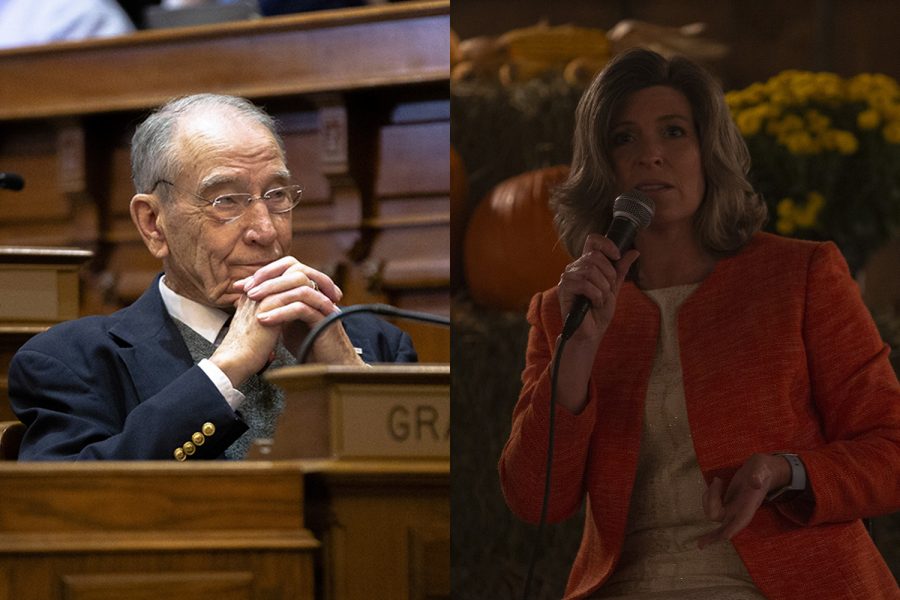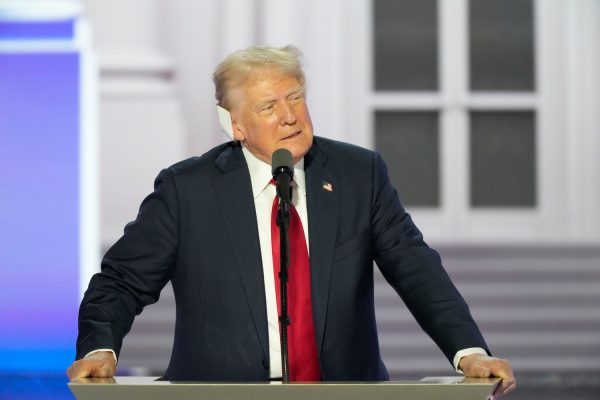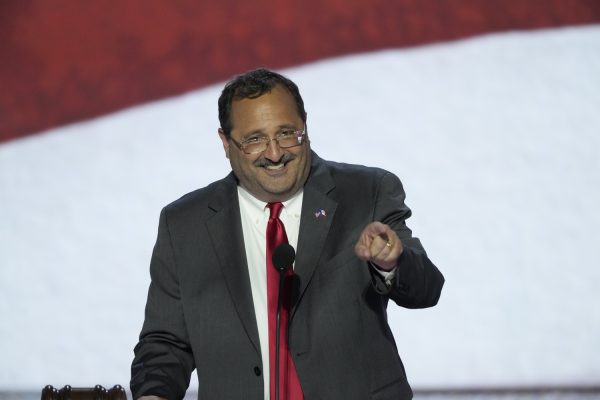Iowa congressional delegation rejects objections to Biden’s electoral victory after riots disrupt count
Congress voted to affirm Joe Biden’s electoral victory by a wide margin, and every Iowa member of Congress rejected objections to electoral results from two states.
Photos of Sen. Chuck Grassley (Katina Zentz/The Daily Iowan) and Sen. Joni Ernst (Hannah Kinson/The Daily Iowan)
January 7, 2021
Iowa’s members of Congress, most Republicans, uniformly voted to reject objections to the electoral results from both Arizona and Pennsylvania late Wednesday night and early Thursday morning, as Congress resumed the counting of electoral votes after supporters of President Trump stormed the U.S. Capitol.
Congress resumed counting electoral votes around 9 p.m., after law enforcement had cleared the Capitol grounds of the mob that had occupied the nation’s Capitol for hours. The final count affirmed President-elect Joe Biden’s win with 306 electoral votes, to Trump’s 232 votes.
After resuming debate on an objection to Arizona’s electoral votes, the U.S. House of Representatives rejected the objection by a vote of 303-121, and the U.S. Senate rejected the objection 93-6. A later objection of Pennsylvania’s results was also rejected. Republican Senators from Iowa Chuck Grassley and Joni Ernst, as well as Iowa’s representatives in the House, all voted to reject the objections.
RELATED: Iowa lawmakers sheltering as rioters storm U.S. Capitol
Republican Reps. Ashley Hinson and Mariannette Miller-Meeks had both made statements earlier in the week saying they would not challenge the electoral college results, but Grassley, Ernst, and Rep. Randy Feenstra, R-Iowa, had not indicated which way they would vote. Rep. Cindy Axne, Iowa’s sole Democrat in Congress, was expected to vote with her party to reject the objections.
Grassley wrote in a statement Wednesday night that Congress is not the place to reject the results of a state election. He noted that dozens of court cases have found no evidence of widespread fraud, and Trump’s legal battles were unable to overturn the results of any state’s election.
“Congress has no role in conducting elections or adjudicating election disputes, only receiving and formally counting the electoral votes cast in each state,” he wrote. “This constitutional process allows the states to determine under their own laws and legal systems how their electoral votes are allocated. And let’s be clear about what the stakes are here. If an objection to a state’s electoral certification is sustained, the state’s electoral votes are thrown out, not reallocated to a different candidate. So anyone voting to object to any state’s certification of electoral votes is voting to disenfranchise an entire state.”
Feenstra, an ardent supporter of Trump, released a statement Wednesday night saying he would not challenge the electoral votes. He went on to call for Congress to hold hearings on election integrity.
“The Twelfth Amendment to the Constitution states, ‘The person having the greatest Number of [Electoral College] votes for President, shall be the President, if such number be a majority of the whole number of Electors appointed,'” Feenstra wrote. “To date, no state has sent a new slate of electors — even though they have the constitutional power to do so. Therefore, the results of the Electoral College will stand.”
Ernst compared the presidential election to Iowa’s 2nd District Congressional election, in which Democrat Rita Hart is challenging Miller-Meeks’s narrow victory with the House of Representatives. While she said she would accept the electoral votes, she also questioned the integrity of the election and said she supports a bipartisan commission to study the administration of the 2020 election.
“Though the margin was close, Iowans spoke and elected Congresswoman Miller-Meeks, and a bipartisan panel in Iowa certified the results,” Ernst wrote. “I view the presidential election results the same way. As a senator, my job is not to overturn the will of voters and choose winners of elections—just like it’s not the House of Representatives’ to handpick who serves as Iowa’s second district congresswoman.”















